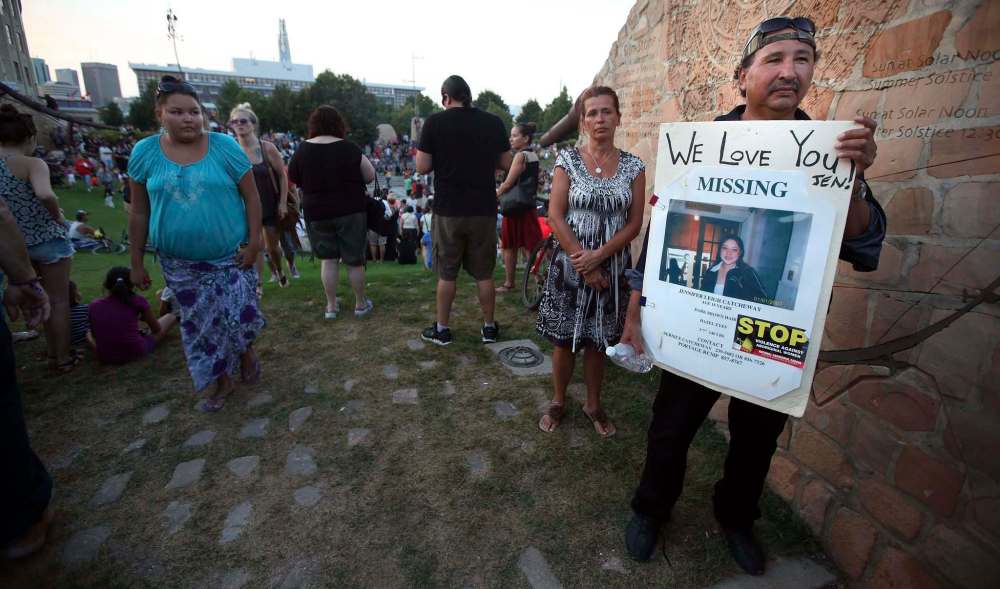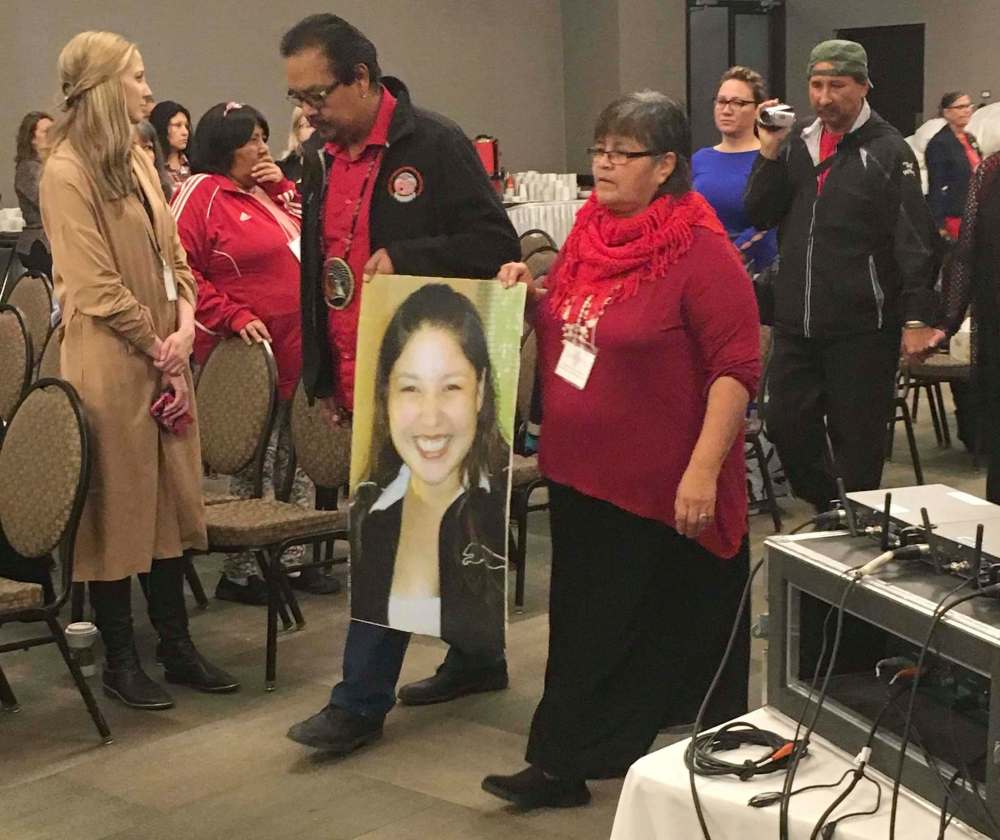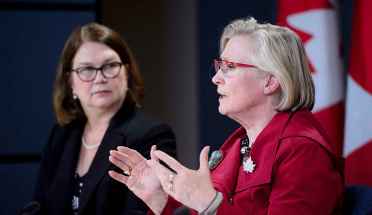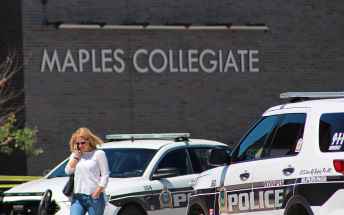Inquiry into missing women extended with more family support
Read this article for free:
or
Already have an account? Log in here »
To continue reading, please subscribe:
Monthly Digital Subscription
$0 for the first 4 weeks*
- Enjoy unlimited reading on winnipegfreepress.com
- Read the E-Edition, our digital replica newspaper
- Access News Break, our award-winning app
- Play interactive puzzles
*No charge for 4 weeks then price increases to the regular rate of $19.00 plus GST every four weeks. Offer available to new and qualified returning subscribers only. Cancel any time.
Monthly Digital Subscription
$4.75/week*
- Enjoy unlimited reading on winnipegfreepress.com
- Read the E-Edition, our digital replica newspaper
- Access News Break, our award-winning app
- Play interactive puzzles
*Billed as $19 plus GST every four weeks. Cancel any time.
To continue reading, please subscribe:
Add Free Press access to your Brandon Sun subscription for only an additional
$1 for the first 4 weeks*
*Your next subscription payment will increase by $1.00 and you will be charged $16.99 plus GST for four weeks. After four weeks, your payment will increase to $23.99 plus GST every four weeks.
Read unlimited articles for free today:
or
Already have an account? Log in here »
Hey there, time traveller!
This article was published 05/06/2018 (2749 days ago), so information in it may no longer be current.
OTTAWA — For years, Wilfred Catcheway has asked officials to help with the mental toll borne by him and other families whose loved ones are among the murdered and missing.
While it may only provide a small measure of solace for Catcheway now — his daughter Jennifer disappeared a decade ago this month — it appears the federal government has finally listened.
On Tuesday, Ottawa opted to give a small extension to the National Inquiry into Missing and Murdered Indigenous Women and Girls, and divert the commissioners’ funding request to support for families.

“In my daughter’s case it’s a little too late,” said Wilfred, who lives in Portage la Prairie. “They dropped the ball on my daughter.”
Crown-Indigenous Relations Minister Carolyn Bennett told reporters she’d tried to reach a balance between families need for closure and commissioners’ demand to double their two-year mandate and $53-million budget.
The Liberals have opted to instead prolong the inquiry by six months, ending next April, and put up almost $50 million for prevention and family support.
“A lot of the families said to us they would rather the money went into the concrete actions,” Bennett said. “They want justice. They want healing and they want us to do everything to make sure that not another family has to go through what they have been through.”
The dysfunctional inquiry has endured frequent turnover, unflattering leaks and bureaucratic bungling. It’s been particularly embattled in the Prairies, after losing the only commissioner of the five who hailed from central Canada, and the only Métis.
Some of the most intense criticism has come from Grand Chiefs Arlen Dumas of the Assembly of Manitoba Chiefs, and Sheila North of Manitoba Keewatinowi Okimakanak. Both have said grieving Manitoba families suffered a traumatizing lack of information and mental-health support.
The government says it’s trying to address those issues with a series of funds. Families and survivors will be able to tap into a $21.3-million support fund for counselling and culturally relevant aftercare, until June 2020.
There’s an extra $5.42 million for grassroots groups and family-liaison units, which are meant to help relatives keep abreast of police investigations. There’s also a $10 million commemoration fund to let national and local groups implement events and possibly monuments over the next two years.
Inquiry continues to face Manitoba criticism
First Nations leaders in Manitoba have been among the most critical of the inquiry, saying one of its key problems is a lack of understanding why so many Manitobans have vanished.
Grand Chiefs Arlen Dumas of the Assembly of Manitoba Chiefs withdrew support for an extension in April, in part over the commissioner’s refusal to establish a Manitoba working group.
Grand Chief Sheila North of Manitoba Keewatinowi Okimakanak has said the top-heavy inquiry needs to learn from cases in the province, like the Winnipeg death of Tina Fontaine.
First Nations leaders in Manitoba have been among the most critical of the inquiry, saying one of its key problems is a lack of understanding why so many Manitobans have vanished.
Grand Chiefs Arlen Dumas of the Assembly of Manitoba Chiefs withdrew support for an extension in April, in part over the commissioner’s refusal to establish a Manitoba working group.
Grand Chief Sheila North of Manitoba Keewatinowi Okimakanak has said the top-heavy inquiry needs to learn from cases in the province, like the Winnipeg death of Tina Fontaine.
Indigenous Services Minister Jane Philpott said that Manitoba families told the pre-inquiry hearings that the province’s dysfunctional child-welfare system is “completely tied into” girls and women disappearing.
Philpott noted the government’s landmark summit on the issue in Ottawa this January, and the funding the Liberals put up both to bridge a discriminatory CFS funding gap (though only after repeated human-rights tribunal condemnations).
She said Ottawa supports “really remarkable work” by groups like the AMC’s family advocate office, which supports families so children aren’t apprehended.
But Dumas questions whether commissioners are getting the message. He revealed in a news release Tuesday that the AMC unsuccessfully asked them to study the role of CFS. The commissioners wrote that such a move would mean “taking time away from the existing hearing schedule.”
Dumas hopes the commissioners use their extra time to examine that issue.
North wrote in a statement that it was “time to turn the page” on the “bungled” inquiry, hoping that the extra six months “make up for the late start to the hearings.”
Meanwhile, Crown-Indigenous Relations Minister Carolyn Bennett said her government gave a short extension because more than one province declined to support the call for more time.
All provinces and territories have signed the inquiry’s current terms, allowing commissioners to subpoena records from any police force until the end of 2018.
Bennett said refused to reveal which provinces were reluctant to extend those powers. “I will just say there was not a consensus in any way to extend the terms of reference,” she said.
The Pallister government said Tuesday that Manitoba gave no position to Ottawa on the matter.
Meanwhile, Bennett claimed the inquiry has gotten past bureaucratic stumblings that led to slow rollout.
Manitoba Sen. Marilou McPhedran had asked commissioners whether controlling bureaucrats in the Privy Council Office were hampering their ability to get work done, after reports that red tape had taken weeks for simple tasks, like getting a computer set up.
Officials said Tuesday that since November, a committee has been meeting weekly with the inquiry to keep things on track. “We’re well on our way to having resolved that,” Bennett said.
Those supports are intended for families just like the Catcheways.
Wilfred claims the RCMP told his wife Bernice that her daughter was probably a drunk, and to wait a week before reporting her missing. That’s not the girl he knew. “She was very friendly; she had her whole life ahead of her.”
The family says the Mounties have hardly been in touch, and claimed officers didn’t bother to check for video footage along Highway 6, after learning she’d vanished in Grand Rapids.
“I don’t believe for a second they’ll find her,” he said. “Somebody took her away from us, and somebody is responsible and whoever it is, is out walking around, everyday.”
Wilfred and Bernice testified at the inquiry last October in Winnipeg, a process that reopened old wounds, but one they hoped would drum up leads.
Ottawa also announced $9.6 million over five years for the RCMP’s investigative-standards unit, aimed at preventing botched investigations. Wilfred says he hopes that funding prevents future tragedies, but he’d also like the inquiry to fund parents like him who are doing investigations they believe go deeper than existing police work..
The commissioners had instead asked for an Indigenous-led task force to review investigations that seem to have faltered. Many families want the inquiry to be able to re-open cold cases.

In a statement, the commissioners expressed “profound disappointment” in Ottawa’s limited extension, calling it a “disservice” to grieving families and the 1,273 witnesses who have written in or appeared at hearings. A commissioner from Quebec said she’d need a few weeks to decide whether she’d continue with the job.
Bennett said she expects that moving the inquiry’s ending from November to next April will be enough time.
“We want to make sure that everybody who wants to be heard will be heard,” she said, adding that she was dismayed by attacks on the commissioners. “I feel sad that the criticism has been personal and that they’re already doing a tough job.”
The women’s wing of the Métis National Council praised Ottawa’s focus on supporting and commemorating families.
“We believe in many, many ways that this is a good-news announcement,” said Melanie Omeniho, head of Les Femmes Michif Otipemisiwak.
In March, the group started designing a process to gather testimony from Métis families, after the inquiry seemed to forget them. For example, at March’s hearings in Thompson, not a single Métis family was present, despite numerous Métis settlements in northern Manitoba.
Omeniho said after multiple meetings, they’re hearing the extension “should engage ways to fill the gaps of the Métis in the inquiry.”
At the Catcheway house in Portage, they’re focusing on honouring their daughter.
“We just want to bring her home, and give a proper burial,” he said. “She’s not a dog to be buried out there some place. Or she could be underwater. All this stuff crosses your mind.”
On June 23, the family is holding a barbecue in their Portage backyard, just days after Jennifer’s 28th birthday. They were planning one just before she disappeared, on the eve of her 18th birthday in 2008. It’s a fundraiser, but they’ve also invited politicians and chiefs, in the hopes of drumming up publicity.
At 10 p.m., Wilfred will set off fireworks, a somber take on what’s normally a happy celebration ritual. “Maybe that’s what it takes for people to listen,” he said.
“Jennifer will never be forgotten. My wife and I will bring her home.”
dylan.robertson@freepress.mb.ca









